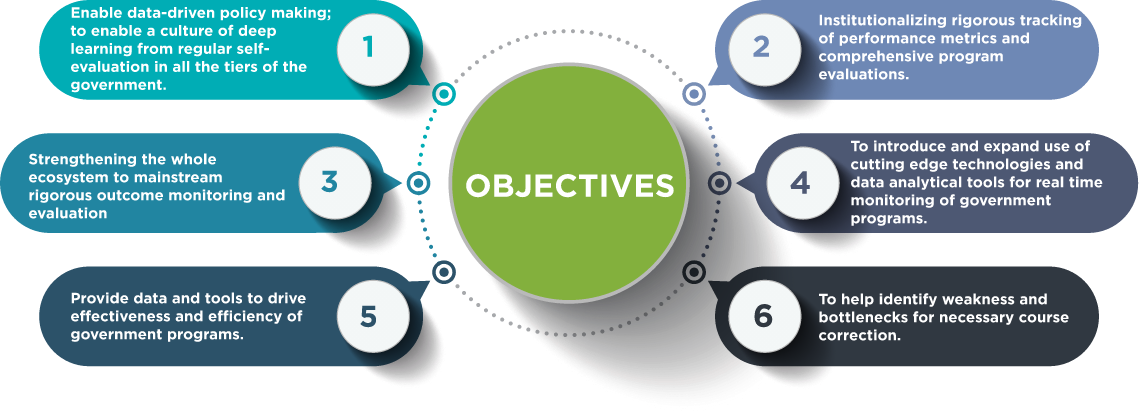Overview
The Development Monitoring and Evaluation Office (DMEO) is an attached office of NITI Aayog. As the apex monitoring and evaluation (M&E) office in the country, DMEO supports the Government achieve the national development agenda through M&E of government policies and programs. Since its inception in 2015, the office aims to support rigorous, data-driven, citizen-centric, and outcomes-driven program management and policymaking.
According to the Cabinet Note that constitutes NITI Aayog, DMEO’s mandate currently involves; (i) monitoring progress and efficacy of strategic and long-term policy and program frameworks and initiatives to help innovative improvements, including necessary mid-course corrections; and (ii) actively monitoring and evaluating the implementation of programs and initiatives, including the identification of the needed resources so as to strengthen the probability of success and scope of delivery. Its mandate also expands to technical advisory to States, under NITI Aayog’s mandate of cooperative and competitive federalism. DMEO’s institutional positioning gives the organization convening power to create a platform for M&E advancement in the country.
Background
DMEO was established by the Government of India on 18th September, 2015 as an attached office of the NITI Aayog by merging the erstwhile Program Evaluation Office and Independent Evaluation Office. To ensure that DMEO is able to function independently, it has been given separate budgetary allocations and manpower in addition to complete functional autonomy. The Programme Evaluation Organization (PEO) was established by the Government of India in October, 1952 with a specific task of evaluating the community development programmes and other intensive area development schemes which were being funded by the Government of India. It worked as a Division of erstwhile Planning Commission and was headed by an Adviser (PEO) who reported to the Member, Planning Commission. PEO had 15 field units (7 Regional Evaluation Offices + 8 Project Evaluation Offices) located across the country. In an effort to accord more functional autonomy to the programme evaluation mechanism in the country, the Government of India established the Independent Evaluation Office (IEO) in November, 2010. The IEO was headed by a Director General, equivalent to a Union Minister of State in rank and status.

DMEO functions
DMEO has been mandated to actively monitor and evaluate the implementation of Government of India (GoI) programmes and initiatives so as to strengthen their implementation and scope of delivery on an ongoing basis. Additionally, DMEO undertakes evaluation of selected programmes/schemes, suo-moto or on the request of the Prime Minister’s Office (PMO) or programme implementing Ministries/ Departments of the Government of India. Broadly, DMEO functions can be categorized into i) Monitoring, ii) Evaluation, and iii) Strategic Initiatives encompassing partnerships and capacity building.
1. Output Outcome Monitoring Framework for 67 M/Ds
2. Data Governance Quality Index for all M/Ds
3. Sector Reviews of 13 infrastructure and 4 social sectors
4. Monitoring 30 Global Indices for Reform & Growth
1. Evaluations of Flagship Schemes
2. Evaluations of 126 Centrally Sponsored Schemes
3. Quick Assessment Studies
4. Knowledge Resources for Evaluations
1. M&E Competency Framework & Curriculum
2. Guidelines, Toolkits & Best Practices
3. Workshops, Webinars, Conference
4. Partnerships
 GOVERNMENT OF INDIA
GOVERNMENT OF INDIA